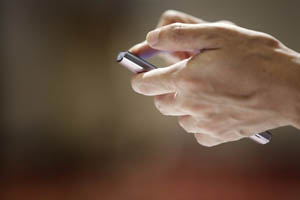That's because the folks behind Wikipedia actually see a non-neutral Internet as one way to spread information cheaply to users in developing countries. With Wikipedia Zero, users in places like Pakistan and Malaysia can browse the site without it counting it counting against the data caps on their cellphones or tablets. This preferential treatment for Wikipedia's site helps those who can't afford to pay for pricey data — but it sets the precedent for deals that cut against the net neutrality principle.
"We have a complicated relationship to it. We believe in net neutrality in America," said Gayle Karen Young, chief culture and talent officer at the Wikimedia Foundation. But, Young added, offering Wikipedia Zero requires a different perspective elsewhere. "Partnering with telecom companies in the near term, it blurs the net neutrality line in those areas. It fulfills our overall mission, though, which is providing free knowledge."
Wikipedia isn't alone. Facebook and Google both operate programs internationally that are exempted from users' data caps — a tactic known somewhat cryptically as "zero rating". And wireless carriers in the United States have recently begun experimenting with the business model. On Monday, T-Mobile expanded the number of zero-rated music services it offers to include Google Play Music and Soundcloud. (Who picks up the tab for the data consumers use varies, but it's typically the content provider.)
Zero rating is still in its infancy in the United States, and given the furor over net neutrality, it's no surprise that the practice is controversial. Civil rights groups argue that low-income Americans who don't see the value in using the Internet could benefit from zero rating, if it were allowed.
These types of services could help "level the playing field for adoption and use" of the Internet, said Nicol Turner-Lee, vice president of the Minority Media and Telecommunications Council. "We have not taken a strong position on zero rating but clearly this is one of those cases where you are trying to encourage more adoption of tech services, particularly for more vulnerable populations where income is a sensitivity."
But others worry that permitting zero-rating is an imperfect tactic for promoting Internet adoption. There are other ways of accomplishing that without harming net neutrality, they say.
One way would be to adapt an existing federal program so that it directly subsidizes broadband for poorer Americans. The program, known as Lifeline, already connects millions to basic telephone service. But it could get millions more connected to high-speed Internet with a few tweaks, according to Gene Kimmelman, chief executive of the consumer advocacy group Public Knowledge.
"Then you'd augment that with digital adoption programs that address literacy," said Kimmelman. "That, to me, is a more direct way to benefit a community."
When it comes to zero-rating, other policy analysts worry that what may be working in developing countries will have unintended consequences if implemented widely in the United States. For instance, in countries where broadband adoption is relatively low, telecom companies benefit from such programs because it allows them to introduce the Internet to a new customer base. For them, zero-rating is a marketing device.
But in the United States, said Marvin Ammori, an American telecom lawyer and activist, there is a different market. Many people already have Internet access, and wireless carriers are focused on widening their profit margins by finding new ways to extract money from customers.
Even in the developing world, zero-rating may be a passing phase — suggesting that the United States may want to avoid it altogether, said Wikimedia Foundation's Young. The question may be "a moot thing in 10 years" as data costs fall around the world or if telecom companies move to block such services, she said.
"Honestly, we don't think we'll have to do it for very long," said Young, "because we think the data charges in these places will come down to the degree that it won't be necessary anymore. It's an interim stopgap until we figure out something better. This is where playing the long game becomes so important."
Source: woshingtonpost,com



![]()
![]() Logging in...
Logging in...